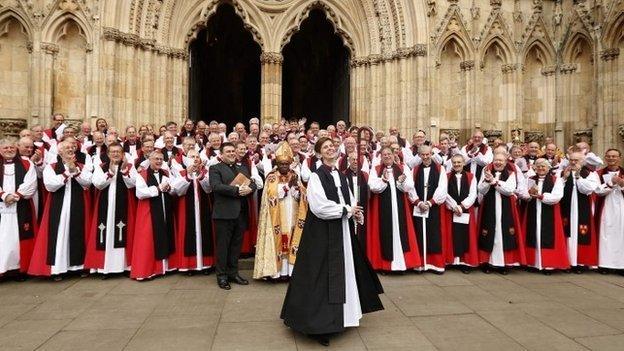What difference are women bishops making?
- Published
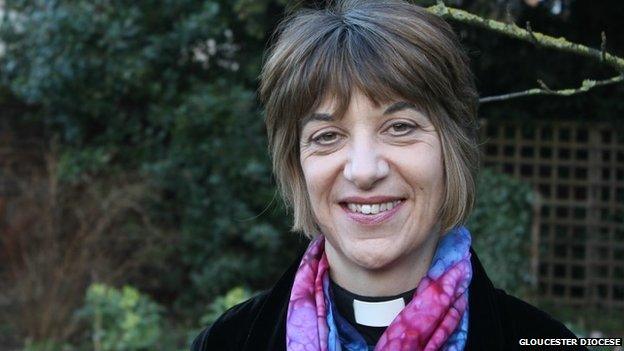
Rachel Treweek is the first woman to run a diocese
Wednesday will see the consecration of the Church of England's most senior woman bishop so far: the first female to be in charge of a diocese.
After Rachel Treweek becomes Bishop of Gloucester, she will also become the first woman bishop to sit in the House of Lords, this autumn. So how are she and the other women bishops making a difference?
When I meet her ahead of her consecration, Rachel Treweek is packing up, preparing to move. She is also worrying about the work being done on the kitchen at the house she will move into with her husband, Guy, another member of the clergy. That is not something many previous incumbents as bishop have had to worry about in earlier centuries or decades.
But the women now rising to senior leadership roles in the Church of England are having to carve out their own paths as they ascend. And as the most senior woman bishop so far, Bishop Treweek knows she will be closely scrutinised as she takes up her new role.
"People often say, 'What difference does it make that women are now in these positions?' and that's quite a hard question," she says.
"I think I'll be someone who is very collaborative. I will take decisions but in a very collaborational way. Women don't live in compartments, we link things together. But first and foremost what I bring is who I am, and part of that is being a woman and responding faithfully to Christ's calling."
Breaking the 'stained glass ceiling'
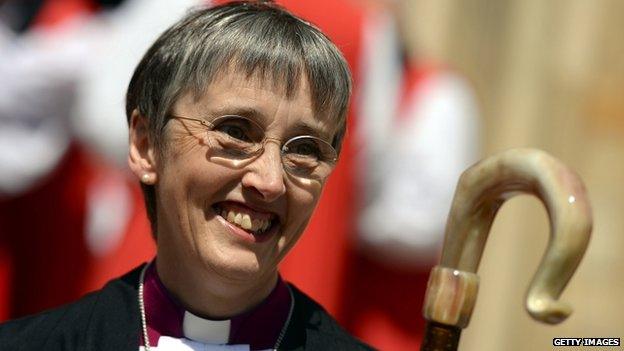
Alison White was consecrated as Bishop of Hull earlier this month
At least six women have now shattered what was known as the "stained glass ceiling" by becoming bishops. The majority are married to other members of the clergy, and one - Alison White - became the first to be married to another bishop, Frank.
Christina Rees campaigned for women's ordination during almost a quarter of a century as a lay member of the general synod, external, the governing body of the Church. Like many, she's thrilled that Rachel Treweek will become the first woman to sit in the House of Lords as part of the Lords Spiritual: a woman on the front bench of the Church.
"Even though I don't like to stereotype women, I think women hold power more lightly," she says. "They have a better way of working through issues - they're less confrontational. So what I hope is that we'll see a more realistic House of Bishops, more in tune with reality and real people, and one that will be more accessible and a little less distant."
'No-one from left field'
However, some at synod expressed their disquiet that those who appoint bishops had chosen women who did not look likely to rock the boat - or at least, not yet. Canon Rosie Harper, who fought hard for female leadership within the Church, says it's still too early to say what impact each woman bishop will have.
"If you speak to them individually, they all say, 'Just you wait and see, they'll make things different and be more radical than people expect.' But clearly the people appointed have all already been deeply involved in the institution. We haven't had anyone from left field.
"It would be unkind to say they'll all be good girl guides - that would be betraying it. But there is a feeling of that. Mostly, they're all married to clergy and the temptation to play the boys' game in order to survive will be very great until there's a much larger number of people."

The Church of England's women bishops
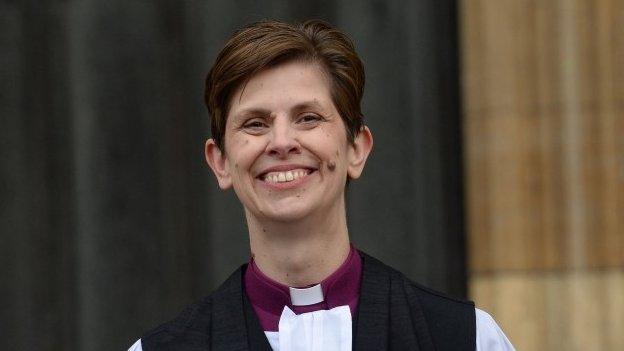
Leading the way: Libby Lane
The Right Reverend Libby Lane - the first female bishop to be consecrated by the Church of England when she was made Bishop of Stockport in January 2015. Her husband George is also a priest
The Reverend Canon Alison White was consecrated as Bishop of Hull on 3 July 2015. Her husband, Frank, is the Assistant Bishop of Newcastle, making the couple the UK's first husband-and-wife bishop partnership
The Venerable Rachel Treweek - to be consecrated as Bishop of Gloucester on 22 July. Her husband, Guy, is a Church of England priest in the diocese of London
The Reverend Dame Sarah Mullally - to be consecrated as Bishop of Crediton on 22 July
The Venerable Ruth Worsley has been announced as the next Bishop of Taunton
The Reverend Anne Hollinghurst will be the next Bishop of Aston. Her husband, Steve, is a part-time tutor with the evangelistic organisation, the Church Army

Rebel with a cause?
As Rachel Treweek looks ahead to her consecration, she admits she feels both nervous and excited about what lies ahead. So could that also include a bit of rebellion?
"I think women priests have had to be rebels in many ways throughout our history. Am I a rebel in that I want to oppose things for the sake of it? No. But am I a rebel in terms of wanting to look at things from a different perspective? Yes, and I hope you'll hear me speaking out in years to come."
But she won't be drawn too far on one of the most divisive issues that lies ahead for the Church of England: that of same-sex marriage.
"For me, it offers us an immense opportunity to have a robust conversation, recognising that we have hugely different viewpoints within the Church. One of my real prayers is that rather than focusing on the issue, we can look at how we can live with difference. Every news story today is about where people have not been able to live with difference," she says.
"And one of the greatest gifts the Church can offer is being able to live together. But it will be hugely painful, and I hope that on this, people will walk towards one another and not away from one another."
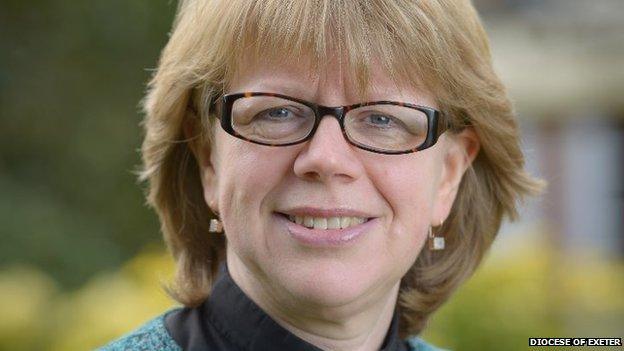
The Reverend Dame Sarah Mullally will also be consecrated as Bishop of Crediton alongside Rachel Treweek at the service at Canterbury Cathedral
Tall order
Linda Woodhead, professor in the sociology of religion at Lancaster University, says that expectations for the first women bishops have been extraordinarily high, which makes them hard to fulfil.
"There is a tendency in all-male groups for a kind of herd mentality, and for everyone to be on message," she believes. "So some people will be hoping that women will shake up the House of Bishops and provide a different voice.
"But of course, it's more likely that safe women are going to be appointed first, and there has been criticism that the fighters for the ordination of women bishops are not the ones who are being appointed first, so these bishops may be a safer pair of hands, and the people less likely to rock the boat."
However, she doesn't believe that women will help stem the decline in the number of people attending Church of England services, which some view as an existential challenge.
"A big problem for the Church of England is that it's in enormous decline. What it has to do is reconnect itself with people and make itself seem interesting and worthwhile again.
"It's a tall order to expect a very small number of women clergy to do that. And in fact part of the problem is breaking down barriers between the clergy and the rest of us. So the fact of appointing more clergy, even of a different sex, may not be enough to help with that problem."
- Published26 March 2015
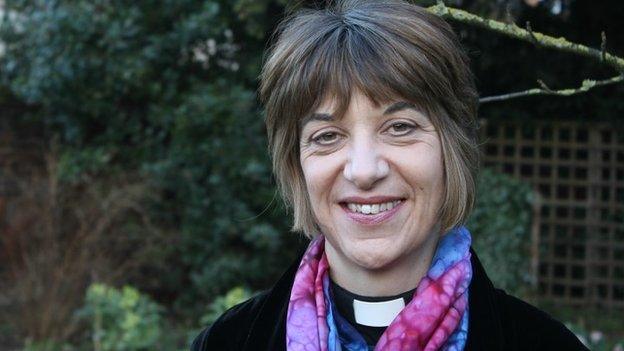
- Published26 January 2015
